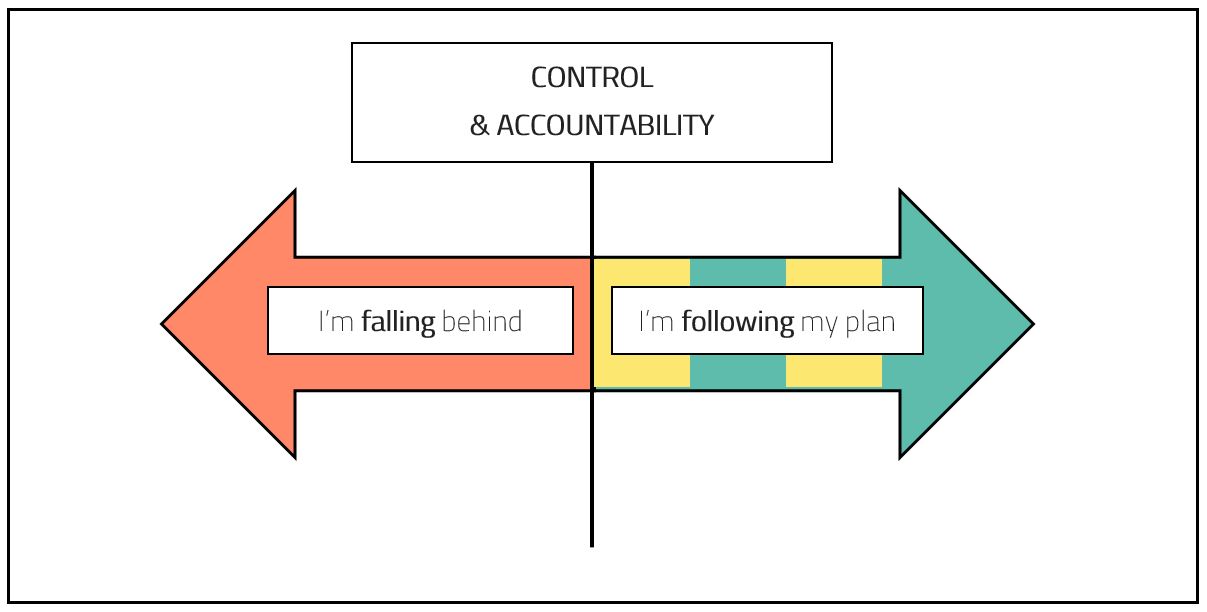
Our CFA Exam Study Planner helps you pass your CFA exam. You can personalize it according to your needs and prepare productively. Use your schedule to study systematically, review regularly, maintain your motivation, and improve your learning strategy.
PART I. STUDY
CONCERN: „MY PREP IS A FIASCO”
Nobody wants that – ‘cos that means a failed CFA exam
You can have CFA exam prep that is a success, not a mess! An important prerequisite is WEEKLY CONTROL… Can you do that?
Think about it.
Weekly goals and weekly study hours are something you can easily control. If your goal is too abstract and beyond your control like “Get ready for my CFA exam”, then you might be setting yourself up for failure. But if your target is “3 Equity readings this week”, it suddenly gets concrete, controllable, and easier to achieve.
That is why – inside your Study Plan – you’ve got all your study readings divided into weeks and weekly lessons.
The study lessons are listed for every reading in the left-hand menu of the STUDY view of your Study Plan. They tell you what to do step by step to get through the readings (and readings are the study units given in your CFA Program curriculum, now aka. modules).
So, when you study:
- use the left-hand menu to navigate between your weekly readings and lessons listed for each reading,
- watch videos, download PDF notes, do tests, and learn formulas that are included inside the lessons,
- check off the watched videos or memorized formulas and add your own notes to the videos, tests, etc.,
- check off the lessons when completed or star them, e.g., for revision,
- summarize your study achievements at the end of each week using the SUM UP button.
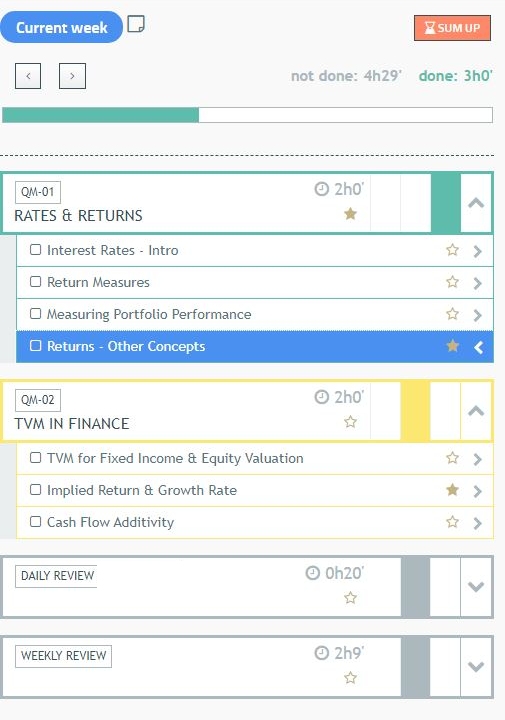
To control your prep:
- you’ve got your benchmark study times given for all readings,
- you can use the checks-and-stars system for the lessons listed for each reading,
- as you check off the lessons, the color of the reading changes (first to yellow for partially done and then to green for done),
- as the color of the readings changes, the weekly progress bar fills in and the weekly study time gets reduced,
- you are recommended to sum up your study achievements after each week to hold yourself accountable – if you fail to follow your plan, the overdue readings will become red as a warning.
STUDY & CONTROL YOUR PREP WEEKLY:
In fact, WEEKLY CONTROL is the only way to develop a growth study process and improve your managing skills. It explicitly identifies both successes and setbacks as you move along your preparation weeks.
PART II. PLAN
CONCERN: „POOR EXECUTION”
Yep. It’s definitely great to have a study plan that prevents your CFA exam prep from being messy simply because it’s based on WEEKLY CONTROL.
However, it doesn’t mean that bad things won’t happen to your prep. After all, procrastination and lack of good management skills are common to many of us…
If you also feel, your study plan execution is poor – learn to balance flexibility with accountability.
To this end – your Study Plan can be flexy and adjustable when you need it but it sets some boundaries, too.
Because we know that no two weeks are the same and that sometimes you won’t be able to devote the required amount of time to studying. But we also know it comes too easy to postpone if there are no consequences.
The Flexibility You Need
To personalize your Study Plan – go to the PLAN view of your Study Plan and use Study Plan options – that allow you to customize your schedule anytime and in many aspects such as: Exam Date, Start Date, topics sequence, topics difficulty, the number of Final Review Weeks, holiday weeks (no study), or your total study time.
ALL PERSONALIZATION FEATURES OF YOUR STUDY PLAN:
- When you schedule (or re-schedule) your CFA exam – adjust your EXAM DATE. If your exam gets postponed, it’s up to you to decide if you want to go with your old study plan and get it tweaked a bit or if you want to create a NEW PLAN.
- You can change the START DATE of your exam prep and the number of Final Review Weeks (note though that the default number of weeks is our recommendation based on your overall exam prep duration).
- Also, modify the topics sequence the way you like. To move the whole topics, simply use drag & drop in your Study Plan options.
- You can change your topics difficulty from medium to hard (to get your topic study time extended) or easy (to get your topic study time reduced).
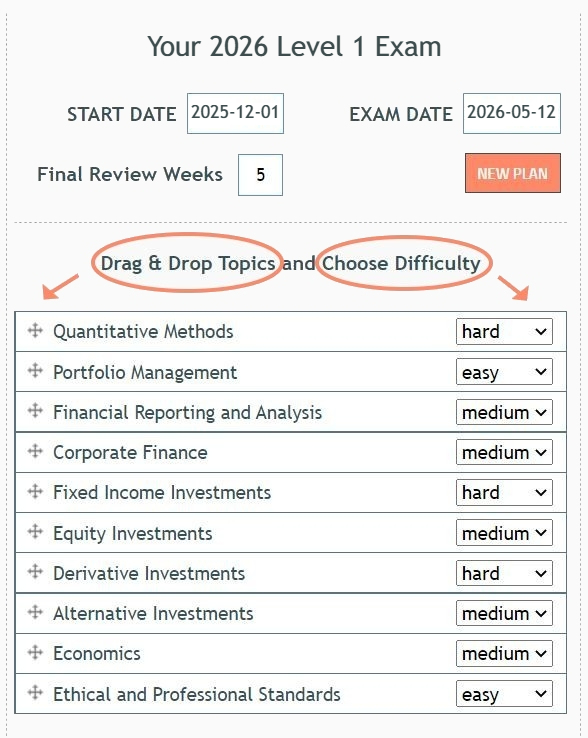
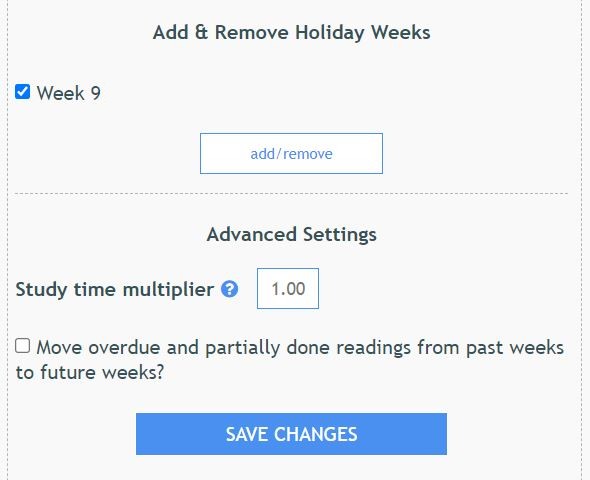
- When some unexpected things happen that keep you away from studying, you can add holiday (no study) weeks. If no longer needed, you can also remove them.
- In advanced settings, you’ll find the study time multiplier, which allows you to increase/decrease your total study time. A standard study plan assumes approx. 300 hours. If you use the multiplier of, e.g., 1.5 or 0.66, you’ll get a total of 450 or 200 hours, respectively.
IMPORTANT After you save the changes, your study plan will be adjusted to your needs.
The Accountability That’s Desired
To help you develop your management skills and accountability:
- you can also drag&drop separate readings from week to week at any moment of your exam prep (manual week-to-week edition makes you aware of the approaching exam and helps you make more responsible decisions while giving you the flexibility you need),
- benchmark study times are given for readings to prevent you from moving readings too much and accumulating them excessively,
- all overdue readings are marked red unless you add them to your current study week (the aim is to make you uncomfortable about your exam prep when your readings are not done and to motivate you to add the overdue readings to your current study week as soon as possible!),
- automatic edition is possible only when you change your topic sequence and you already started some topics – if you have any overdue or partially done readings for these topics and you want to automatically move those readings to the future – you can do that by checking the appropriate box in the advanced settings of your Study Plan options,
- if you’re not following your Study Plan – sorry, there can be no automatic rescheduling of your whole study plan (because the worst thing for you would be to realize too late that you’re stuck with a pile of readings impossible to cover before your exam + automatic rescheduling would suggest you are not behind the schedule while you are!).
Mind that – while flexibility is desired – making excuses is what destroys your exam prep.
All you need to do now is to stay committed to your study schedule. The plan is good for you because it:
- gives you control,
- holds you accountable, and
- develops your sound management skills.
Just do your lessons, get your readings marked green for done or yellow for partially done, sum up your weekly study tasks, e.g., every Sunday, and edit your study plan if needed but in a way that feeds both your needs and your goals.
NEED TO PERSONALIZE YOUR STUDY PLAN?
PART III. PROGRESS
CONCERN: „AGAIN DROPPING OUT”
Can’t stay motivated to keep on going from week to week? It’s no surprise that your progress is slowing down – it’s your motivation playing tricks on you and laughing…
Did you know that your motivation is at its peak only twice during your CFA exam prep?
Motivation Smile :D
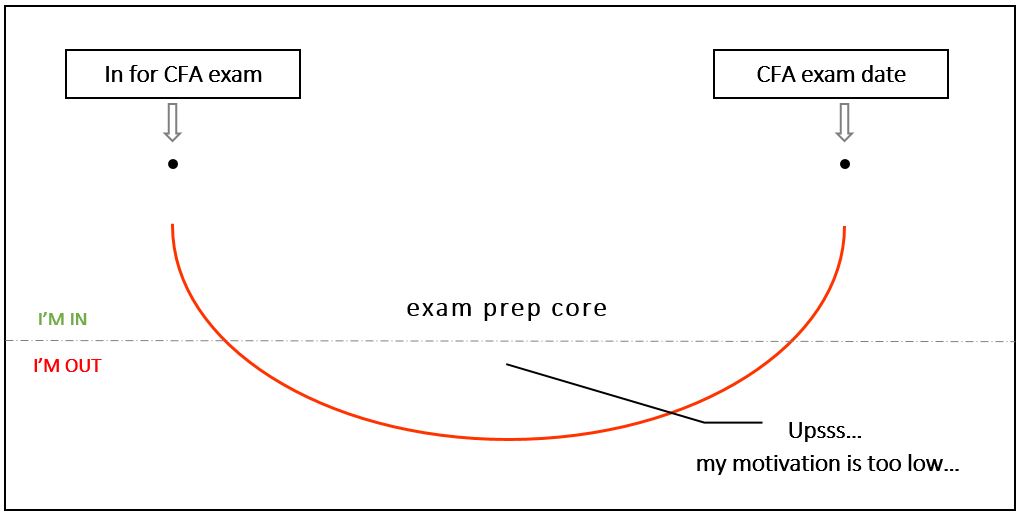
Your motivation is high after you register for your exam and shortly before you take it.
It is the highest when you register for your CFA exam and just before the exam is due. Meanwhile, your motivation tends to be lower (often much lower…) and usually hits its bottom halfway through your preparation period. Ironically, this phenomenon can be illustrated with a happy smile...
To keep your study motivation strong, you need constant encouragement in the form of both internal and external motivation.
Internal motivation is what you find inside yourself when you think about your urge to pass your CFA exam. But your internal motivation will become weaker and weaker as your prep proceeds – look at the picture above, do you see that smile?
That’s why you need some external stimuli that will make your prep more attractive and your goal worth achieving.
My Chance-to-Pass Score

To keep you motivated, your Study Plan shows your progress on many levels, from daily checks to your overall Chance-to-Pass score.
You can see your progress:
- daily > when you check off your lessons – readings will change color, first to yellow for partially done, then to green for done,
- weekly > as you get your readings done, the progress bar for your current study week fills up and the weekly benchmark study time gets reduced,
- by topics > after you choose the Progress view of your Study Plan, you’ll see a Gantt chart displaying your progress by topics,
- overall > below the Gantt chart, you can also view your Chance-to-Pass score hopefully going up from week to week.
All this is to help you keep your motivation at a level that is not destructive to your exam prep. While a small drop in your motivation over time is probably just natural, you must maintain it strong enough to study systematically.
Motivation Smile :)
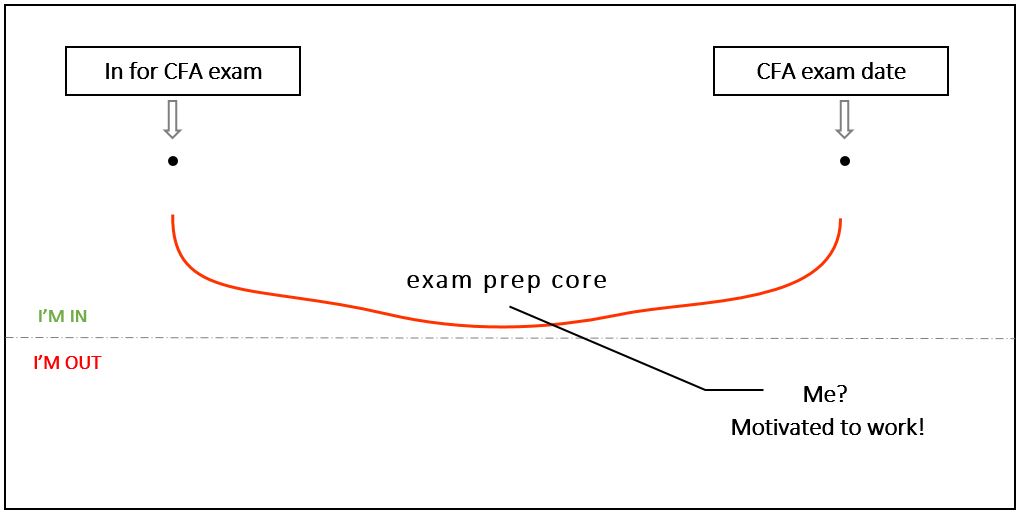
A small drop in your motivation over time is probably just natural :)
You are encouraged to study systematically thanks to:
- weekly summaries of your study achievements – they affect your Chance-to-Pass score positively by showing your commitment and determination – the qualities you need to develop for successful study plan execution.
- messages sent regularly to your inbox to help you develop a good study routine – and with a good study routine – you can execute your study plan effectively.
Remember that you need to keep up your good work over all the months of your exam prep, not just the first few weeks. Ideally – to improve your study process – you should also rethink your study strategy every time you make your weekly summary and react if things go wrong.
Such weekly reassessments will definitely make you grow and refine your study routine.
SUM UP YOUR WEEKLY ACHIEVEMENTS:
And a successful study routine is a combination of 2 factors: high motivation & good performance. That is why quality studying is something we help you develop.
PART IV. REVIEW
CONCERN: „I’M FORGETTING TOO MUCH”
Did you realize that not all who study – actually learn? At least, not with the same satisfying effect...
Your ultimate goal is for your study time to be quality time. You can only achieve that if you regularly review what you study.
You think you don’t need it? Consider this:
Forgetting Is Natural:
How Human Memory Works
Our memory has its limits. It can’t & won’t store everything.
This distinctive characteristic of the human brain is about the economy of its functioning. We are bombarded daily with tons of info. It would be exhausting to remember each and every detail of our lives: what we saw, what we heard, what we read... That’s why our memory filters all the information and retains only what it finds worth remembering.
At the time when we get to know new things, our information retention is 100%. However, it starts to drastically fall over the following hours and days as we don’t use the info. This phenomenon is called the forgetting curve and it was first described in 1885 by Hermann Ebbinghaus:
Forgetting Curve
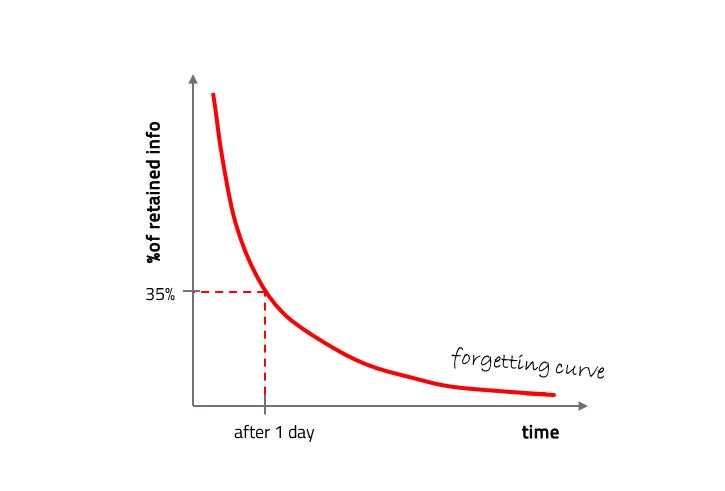
The retention of information decreases with time.
On the one hand, it’s a natural process. But on the other, it’s truly harmful when you’re preparing for your CFA exam!
How deep your forgetting curve is depends on the attention you pay to the specific information or the strength of your memory as such. Sadly – though – you will forget even up to 65% of what you study today by tomorrow evening.
If you do nothing about your forgetting curve – you waste your study time by letting like half of it simply be gone with the wind.
To not let that happen, inside your Study Plan you’ve got your regular review sessions scheduled. Also, there are apps and materials you can use to revise your study content.
It’s best you review daily, weekly, after topics, and – of course – just before your exam.
The pre-exam revision is something most candidates do. In your Study Plan, it’s called Final Revision and it depends on the duration of your whole exam prep, which means it will be longer if you start your preparation sooner.
But what makes the difference is the regular revision meanwhile. This is not so popular with CFA candidates, which is reflected in rather low pass rates!
To review, use frequently:
- printable e-books (ready-made PDF notes),
- Test Generator,
- Formulas App,
- but also our to-the-point videos, which are short and can be watched more than once.
Learning Curve
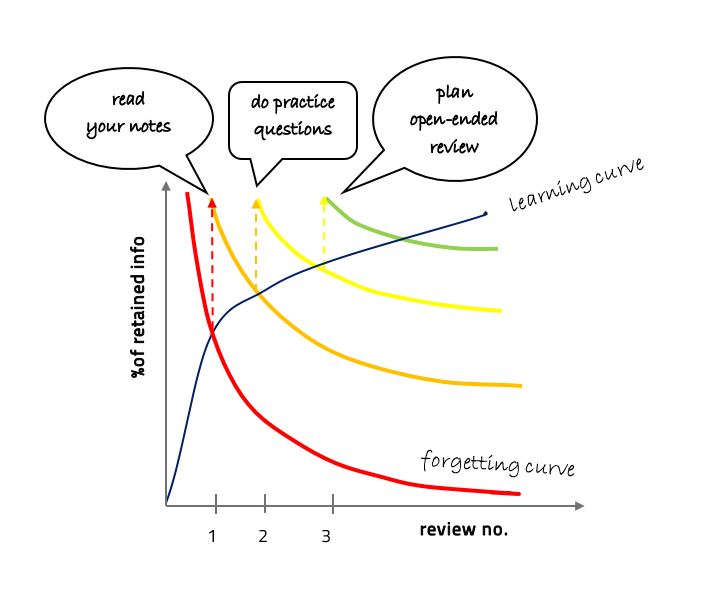
The retention of information increases with revision.
The idea behind systematic review sessions is to improve your study process by making your studying more productive.
Still not convinced?
Ebbinghaus says overlearning (i.e., when you practice something a bit more than would do to memorize it) is not dangerous. On the contrary – it shallows your forgetting curve significantly and ensures more successful knowledge retention.
By applying your proper review system, which is more than just pre-exam revision, you will be able to develop the habit of effective learning.
As we said: millions of times a day our brains need to decide what’s worth remembering and what’s redundant. By reviewing and practicing the chosen bits of your CFA Program curriculum – you imply they’re important. That is how they get transferred from your short-term to your long-term memory and safely – in your brain – to the testing room on your exam day!
So – to review efficiently – use the REVIEW view of your Study Plan and browse for the study content you want to review, e.g., Quantitative Methods videos, Derivative Investments formulas, given sections of Ethics study lessons, or even whole study lessons for your chosen topics:

For instance:
- To review the previously starred formulas from the Derivative Investments topic, choose 'Formulas' from the drop-down list of content types, 'Derivative Investments' from the drop-down list of topics, and indicate that you want to view only the 'Starred' formulas, be it in the past or future study weeks.
- Now, you can easily view the formulas using the NEXT & PREVIOUS buttons to switch between them.
- Also, mind that you can choose to show formulas as flashcards – then, you'll have the formulas hidden and you'll need to click to see if you get them right.
PART V. IMPROVE
YOUR STUDY SKILLS
Here’s how you can improve your study skills and grow as a learner:

- study when you’re at your daily peak performance,
- develop your study routine,
- find the motivation to persist in studying,
- enhance your management skills,
- consistently assess your studying process,
- REVIEW & PRACTICE REGULARLY!
HERE’S A THOUGHT:
Never think you won’t pass your CFA exam. Also, never think you’ll surely pass your CFA exam. While strong faith in your abilities is part of your success, so is full effort. Without full effort, you’re unlikely to achieve.
KNOW THIS:
Together with a brainiac, there’s also a hard worker in you!
Published: Jan 11, 2021
Source (Sisyphus): https://www.deviantart.com/setvasai/art/SIZIF-190794496

